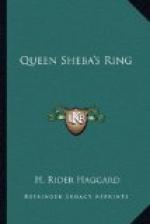Overwhelmed with physical and mental misery, I began to doze; Orme grew silent, and the Sergeant, having remarked that there was no need to bother, since what must be must be, consoled himself in a corner by humming over and over again the verse of the hymn which begins:
“There is a blessed
home beyond this land of woe,
Where trials never come
nor tears of sorrow flow.”
Fortunately for us, shortly before dawn the “tears of sorrow” as represented by the rain ceased to flow. The sky cleared, showing the stars; suddenly the vault of heaven was suffused with a wonderful and pearly light, although on the earth the mist remained so thick that we could see nothing. Then above this sea of mist rose the great ball of the sun, but still we could see nothing that was more than a few yards away from us.
“There is a blessed home beyond this land of woe”
droned Quick beneath his breath for about the fiftieth time, since, apparently, he knew no other hymn which he considered suitable to our circumstances, then ejaculated suddenly:
“Hullo! here’s a stair. With your leave I’ll go up it, Captain,” and he did.
A minute later we heard his voice calling us softly:
“Come here, gentlemen,” he said, “and see something worth looking at.”
So we scrambled up the steps, and, as I rather expected, found ourselves upon the top of one of two towers set above an archway, which towers were part of a great protective work outside the southern gates of a city that could be none other than Harmac. Soaring above the mist rose the mighty cliffs of Mur that, almost exactly opposite to us, were pierced by a deep valley.
Into this valley the sunlight poured, revealing a wondrous and awe-inspiring object of which the base was surrounded by billowy vapours, a huge, couchant animal fashioned of black stone, with a head carved to the likeness of that of a lion, and crowned with the uraeus, the asp-crested symbol of majesty in old Egypt. How big the creature might be it was impossible to say at that distance, for we were quite a mile away from it; but it was evident that no other monolithic monument that we had ever seen or heard of could approach its colossal dimensions.
Compared to this tremendous effigy indeed, the boasted Sphinx of Gizeh seemed but a toy. It was no less than a small mountain of rock shaped by the genius and patient labour of some departed race of men to the form of a lion-headed monster. Its majesty and awfulness set thus above the rolling mists in the red light of the morning, reflected on it from the towering precipices beyond, were literally indescribable; even in our miserable state, they oppressed and overcame us, so that for awhile we were silent. Then we spoke, each after his own manner:
“The idol of the Fung!” said I. “No wonder that savages should take it for a god.”
“The greatest monolith in all the world,” muttered Orme, “and Higgs is dead. Oh! if only he had lived to see it, he would have gone happy. I wish it had been I who was taken; I wish it had been I!” and he wrung his hands, for it is the nature of Oliver Orme always to think of others before himself.




